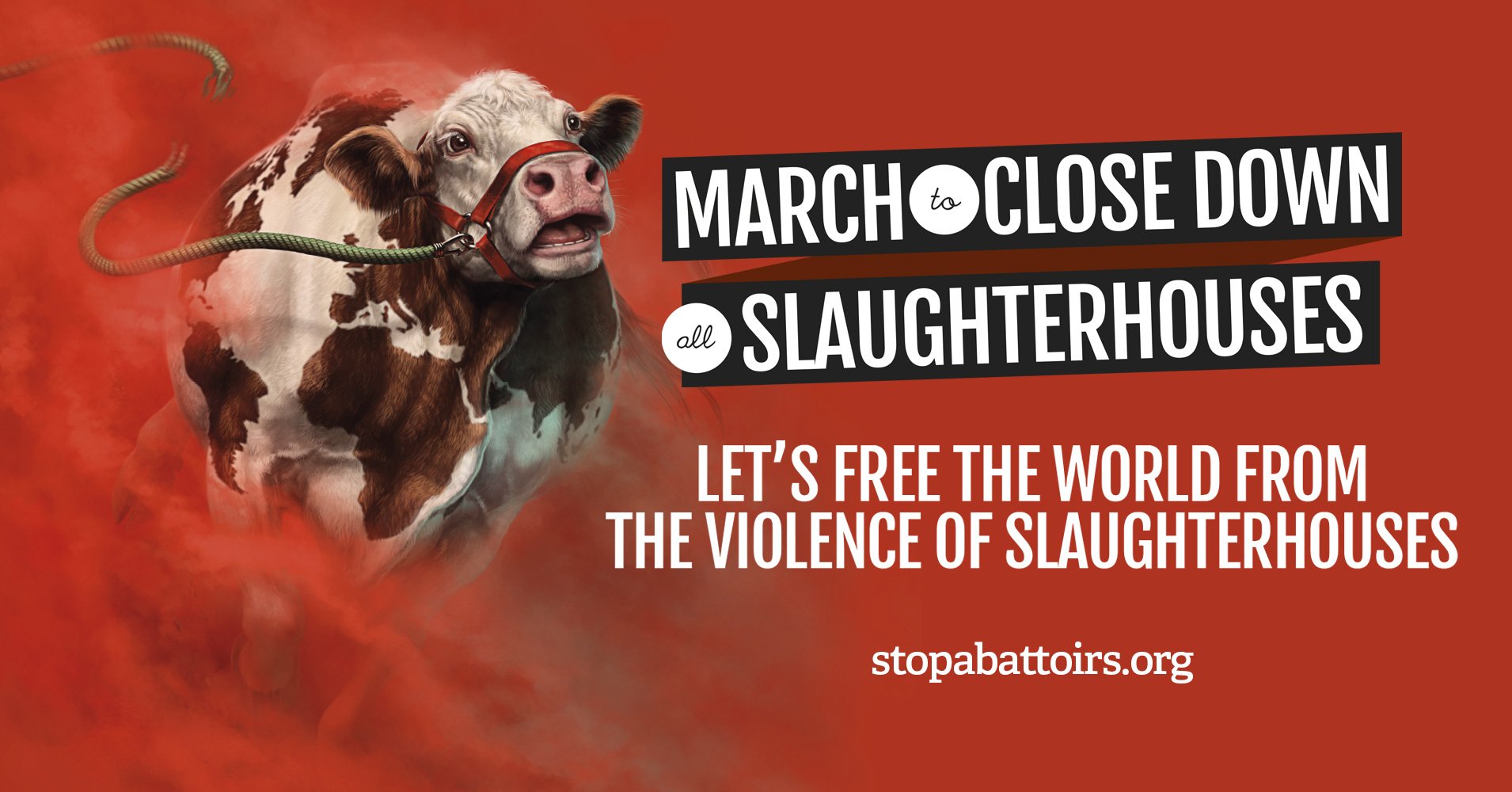City, date
In [city], on [date] at 2.30pm there will be a meeting at [...].
Then, the protesters will march to the square [...] where the 3rd edition of the Vegfest, a public debate society, will put forward credible alternatives to the "products" of the slaughterhouses.
→ Website of the march for the closure of slaughterhouses
What: March for the closure of slaughterhouses
When: Saturday, 2nd June 2.30pm
Where: he old slaughterhouses of Vaugirard, Square Georges Brassens, rue des Morillons, Paris XV.
At the same time, a march will take place in [cities], from the city centre to the slaughterhouses.
Press Contact:
Name : Phone Number
Name : Phone Number
Photos and videos available upon request
Killed unnecessarily
Slaughterhouses, either on land or at sea, are working at full capacity: every year, about 60 billion land animals are killed; the number of caught fish is approximately 1000 billion, to which hundreds of billions of victims of aquaculture can be added. Most of the reared animals live a horrifying existence before they are put to death. Yet, these bred or captured animals are conscious beings; they have knowledge, desires, emotions.
We know human beings do not need animal products to live a healthy life. The existence of millions of vegetarians all over the world is ample evidence that it is possible to eat healthily without taking part in this bloodshed. Farming practices produce enough plant-based foodstuffs to provide each and everyone with a high quality diet.
→ Offical position of the American Dietetic Association
Meat, yes, but without making animals suffer?
This is the most commonly expressed view. But it is unrealistic to imagine we can one day manage to offer a decent life and a painless death to the billions of animals killed each year throughout the world for the human diet.
How could a farmer who produces chicken meat with thousands of birds, with the best of intentions in the world, ensure them appropriate living conditions? How many millions of extra people would need to be paid to properly look after the animals? Who will pay the tens of thousands of inspectors who would be necessary to carefully check that standards are being kept up?
Sacred life vs. Expendable life
Even perpetrated "decently," the murder of a human being is considered the worst of crimes. Conversely, cutting the throat of animals in slaughterhouses and the suffocation of fish out of water are trivialised activities. A whole industry is working for it. How can such an asymmetry in the value granted to the lives of the former and the latter be justified?
Closing slaughterhouses: a utopian project?
The moral condemnation of the mistreatment of animals is widely shared: most people agree that they should not have to suffer for no good reason, nor be killed without necessity.
It is factually true that farming, hunting and fishing kill, and that they inflict considerable pain on animals. It is factually true that humans do not need to consume animal products in order to lead healthy lives. Not eating meat does not bar the way to a fulfilled life or the enjoyment of eating.
Spontaneous changes in consumer behaviour are not sufficient to put an end to the butchery. The problems of road safety, pollution, human poverty or child abuse cannot be solved just by relying on the capacity of each person to modify their habits to remedy the situation, even when they are generally acknowledged to be wrong. In all of these areas, progress demands resorting to legislation and public policies, which is justified since mistreatment, torture and killing remain outside of the legitimate domain of individual liberties.
It is a question of obtaining the consent of our societies to eradicate this practice, based on the recognition of the great harm that it causes to animals. This recognition only requires the effective application of what is already common morality. The demand for meat abolition will take place in the current political agenda. We can imagine its culmination within the framework of institutions and social organisation that we already know.
An old demand
We have engaged in critical reflection about the implications of animal use for food since antiquity and continue to today. From Plutarque to Yourcenar, Voltaire or Gandhi, many renowned thinkers participated in this reflection. Some societies refused killing for food, such as the Cathares and a noteworthy part of the population of India or the wise Sufis. The success of Jonathan Safran Foer’s book Eating Animals indicates this reflection is, more than ever, a current concern.
Past injustices have been abolished or reduced, such as human slavery or the inferior status assigned to women. They were also supported by powerful interests; they were also deeply rooted in the collective consciousness to the point that the majority believed them to be eternal.
So why not farming and fishing?
Press Contact:
Name : Phone Number
Name : Phone Number
Photos and videos available upon request
